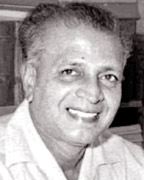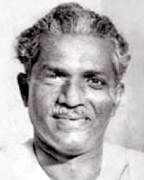Voting responsibly
 Three important, interrelated events took place on Thursday, which
are connected to the state of Sri Lanka’s democracy. Three important, interrelated events took place on Thursday, which
are connected to the state of Sri Lanka’s democracy.
Firstly, nominations closed for the election of the 108 members of
the Eastern (EP), North Central (NCP) and Sabaragamuwa (Sab PC)
Provincial Councils. Polling will take place on September 8, with 3,073
candidates taking part.
The last time elections were held to these regional bodies, in 2008,
there was a war raging in the country. While the Eastern Province was
affected more than the others, nevertheless the security situation
everywhere was such that many people were afraid to go out and vote.
For the first time (in effect, since the devolution of power in 1987)
the people will be able to go out and vote for their Provincial Council
candidates in a state of peace. This bodes well for the future of the
democratic process.
|

Parliament - seat of democracy. File photo |
On the other hand, Thursday’s second event does not. The Deputy
Speaker, Chandima Weerakkody told the House that members should act and
speak in the chamber with decorum and dignity. He added that members
should not ring the quorum bell for the fun of it.
Local Councillors
He was responding to Chief Government Whip and Minister of Water
Supply and Drainage Dinesh Gunawardena, who brought to his notice the
fact that members had rung the quorum bell three times for amusement.
The minister observed that these members were aware that other
members were taking part in committees, such as the Committee on Public
Enterprises and the Committee on Public Protection, so they need not
have rung the bell three times in two hours.
He remarked that the members were democratically elected to serve the
public and should therefore act responsibly.
Thursday’s third happening was General Secretary of the Sri Lanka
Freedom Party, Maithripala Sirisena telling the press that party members
who are charged with sexually abusing children will be expelled from the
party and their posts in government would be forfeit. Local Councillors
have allegedly been involved in the rape of under-age girls in Akuressa
and Tangalle.
It is of utmost importance that politicians should set a good example
for the people whom they represent. Wednesday’s mob invasion of a
magistrate’s court in Mannar exemplified the state of lawless that has
gripped the country.
And no wonder, for we find politicians implicated in acts of violence
all around the island. A Parliamentarian has been arrested for allegedly
biting off a person’s nose and a Provincial Councillor has been
apprehended in connection with a murder in Anamaduwa.
Successful candidates

Dr. NM Perera |

Philip Gunawardena |
In addition to the Local Councillors implicated in child-rape, others
have allegedly been involved in the double murder of a mother and
daughter in Kahawatte, in the murder of a youth in Weligepola, in the
murder of tourist and the rape of his partner in Tangalle, and in the
rape of a woman in Dolapihilla.
In this context, the ringing of the parliamentary quorum bell for
kicks can almost be seen as decorous and dignified behaviour for
politicians.
One of the reasons for the increasingly aberrant behaviour of
politicians is the changing background of successful candidates. In
earlier times, the House thronged with intellectuals of the calibre of
SWRD Bandaranaike, SA Wickremasinghe, Philip Gunawardena, NM Perera, CWW
Kannangara, W Dahanayake, Pieter Keuneman, SJV Chelvanayakam, C
Sittampalam, RSV Poulier, Colvin R de Silva, TB Ilangaratne, TB
Subasinghe, Badi-ud-Din Mahmud, IMRA Iriyagolla and Felix Dias
Bandaranaike.
The Senate was, if anything even more packed to the rafters with the
intelligentsia, while not being devoid of a blend of social classes.
Doric de Souza rubbed shoulders with S Nadesan and M Tiruchelvam, and
with such an erudite members of the working class as DG William.
Parliament held working-class writers and peasant poets as well as
golden brains from British universities.
Even the gleam of such later political intellectuals as Neelan
Thiruchelvam and Lalith Athulathmudali dulls in comparison with these
giants of the past. And local government politicians were not
necessarily any worse.
Nowadays, successful politicians tend to be drawn from a single
social group - successful businessmen, who can afford to fund their own
election.
Many get their income from shady commerce - pimping, illicit alcohol
and drugs. Money has displaced intellect and education as the
measuring-stick of success.
Wealth and political power combined - what a heady mix. The sky
appears to be the limit and many politicians fall prey to Lord Acton’s
dictum on the corrupting effect of power. The line between right and
wrong - anyway already blurred - becomes non-existent. The politician
becomes the socio-path.
Female parliamentarians
The surfeit of sexual incidents involving politicians is also
symptomatic of the paradoxical comparative withdrawal of women from
politics, as the same time as their status in education and employment
is strengthened.
Whereas Sirimavo Bandaranaike, the world’s first woman Prime
Minister, was preceded by a bevy of female parliamentarians of the
calibre of Adeline Molamure, Naysum Saravanamuttu, Florence Senanayake,
Kusuma Gunawardena, Doreen Wickremasinghe, and Tamara Kumari Ilangaratne,
today women’s representation in politics is one of the lowest in SAARC.
The problem does not lie in the non-availability of candidates,
although it does matter in certain areas. For example, in the 2008-9
Provincial Council elections, 7.5 percent of candidates were women, but
only 4.1 percent of those elected were. In the NCP women were 9.5
percent of candidates and just 3.0 percent of those elected, while in
the Sabaragamuwa PC they were 12 percent but only 3 percent of those
elected; although, to be fair, in the EP there was a favourable ratio,
0.8 percent to 2.7 percent.
The lesson in this is that the future of politics rests in the
voters’ hands. It is not only the vote for the party which matters but
also the preference vote for the candidate.
It is to be hoped that, this time around, voters will begin to see
beyond the fluff and elect good and true politicians as their
representatives. |



